- Home
- D. H. Lawrence
The Ladybird Page 3
The Ladybird Read online
Page 3
'Is he gentle? Is he tender? Is he a dear lover?'
She turned her face aside, displeased.
'Yes,' she replied curtly.
He did not answer. And when she looked again he was lying with his
eyes shut, a faint smile seeming to curl round his short,
transparent nose. She could faintly see the flesh through his
beard, as water through reeds. His black hair was brushed smooth
as glass, his black eyebrows glinted like a curve of black glass on
the swarthy opalescence of his brow.
Suddenly he spoke, without opening his eyes.
'You have been very kind to me,' he said.
'Have I? Nothing to speak of.'
He opened his eyes and looked at her.
'Everything finds its mate,' he said. 'The ermine and the pole-cat
and the buzzard. One thinks so often that only the dove and the
nightingale and the stag with his antlers have gentle mates. But
the pole-cat and the ice-bears of the north have their mates. And
a white she-bear lies with her cubs under a rock as a snake lies
hidden, and the male bear slowly swims back from the sea, like a
clot of snow or a shadow of a white cloud passing on the speckled
sea. I have seen her too, and I did not shoot her, nor him when he
landed with fish in his mouth, wading wet and slow and yellow-white
over the black stones.'
'You have been in the North Sea?'
'Yes. And with the Eskimo in Siberia, and across the Tundras. And
a white sea-hawk makes a nest on a high stone, and sometimes looks
out with her white head over the edge of the rocks. It is not only
a world of men, Lady Daphne.'
'Not by any means,' said she.
'Else it were a sorry place.'
'It is bad enough,' said she.
'Foxes have their holes. They have even their mates, Lady Daphne,
that they bark to and are answered. And an adder finds his female.
Psanek means an outlaw; did you know?'
'I did not.'
'Outlaws, and brigands, have often the finest woman-mates.'
'They do,' she said.
'I will be Psanek, Lady Daphne. I will not be Johann Dionys any
more, I will be Psanek. The law has shot me through.'
'You might be Psanek and Johann and Dionys as well,' she said.
'With the sun on my face? Maybe,' he said, looking to the sun.
There were some lovely days in the spring of 1918. In March the
Count was able to get up. They dressed him in a simple, dark-blue
uniform. He was not very thin, only swarthy-transparent, now his
beard was shaven and his hair was cut. His smallness made him
noticeable, but he was masculine, perfect in his small stature.
All the smiling dapperness that had made him seem like a monkey to
Daphne when she was a girl had gone now. His eyes were dark and
haughty; he seemed to keep inside his own reserves, speaking to
nobody if he could help it, neither to the nurses nor the visitors
nor to his fellow-prisoners, fellow-officers. He seemed to put a
shadow between himself and them, and from across this shadow he
looked with his dark, beautifully-fringed eyes, as a proud little
beast from the shadow of its lair. Only to Daphne he laughed and
chatted.
She sat with him one day in March on the terrace of the hospital,
on a morning when white clouds went endlessly and magnificently
about a blue sky, and the sunshine felt warm after the blots of
shadow.
'When you had a birthday, and you were seventeen, didn't I give you
a thimble?' he asked her.
'Yes. I have it still.'
'With a gold snake at the bottom, and a Mary-beetle of green stone
at the top, to push the needle with.'
'Yes.'
'Do you ever use it?'
'No. I sew rarely.'
'Would it displease you to sew something for me?'
'You won't admire my stitches. What would you wish me to sew?'
'Sew me a shirt that I can wear. I have never before worn shirts
from a shop, with a maker's name inside. It is very distasteful to
me.'
She looked at him--his haughty little brows.
'Shall I ask my maid to do it?' she said.
'Oh, please, no! Oh, please, no, do not trouble. No, please, I
would not want it unless you sewed it yourself, with the Psanek
thimble.'
She paused before she answered. Then came her slow:
'Why?'
He turned and looked at her with dark, searching eyes.
'I have no reason,' he said, rather haughtily.
She left the matter there. For two weeks she did not go to see
him. Then suddenly one day she took the bus down Oxford Street and
bought some fine white flannel. She decided he must wear flannel.
That afternoon she drove out to Hurst Place. She found him sitting
on the terrace, looking across the garden at the red suburb of
London smoking fumily in the near distance, interrupted by patches
of uncovered ground and a flat, tin-roofed laundry.
'Will you give me measurements for your shirt?' she said.
'The number of the neck-band of this English shirt is fifteen. If
you ask the matron she will give you the measurement. It is a
little too large, too long in the sleeves, you see,' and he shook
his shirt cuff over his wrist. 'Also too long altogether.'
'Mine will probably be unwearable when I've made them,' said she.
'Oh no. Let your maid direct you. But please do not let her sew
them.'
'Will you tell me why you want me to do it?'
'Because I am a prisoner, in other people's clothes, and I have
nothing of my own. All the things I touch are distasteful to me.
If your maid sews for me, it will still be the same. Only you
might give me what I want, something that buttons round my throat
and on my wrists.'
'And in Germany--or in Austria?'
'My mother sewed for me. And after her, my mother's sister, who
was the head of my house.'
'Not your wife?'
'Naturally not. She would have been insulted. She was never more
than a guest in my house. In my family there are old traditions--
but with me they have come to an end. I had best try to revive
them.'
'Beginning with traditions of shirts?'
'Yes. In our family the shirt should be made and washed by a woman
of our own blood: but when we marry, by the wife. So when I
married I had sixty shirts, and many other things--sewn by my
mother and my aunt, all with my initial, and the ladybird, which is
our crest.'
'And where did they put the initial?'
'Here!' He put his finger on the back of his neck, on the swarthy,
transparent skin. 'I fancy I can feel the embroidered ladybird
still. On our linen we had no crown: only the ladybird.'
She was silent, thinking.
'You will forgive what I ask you?' he said, 'since I am a prisoner
and can do no other, and since fate has made you so that you
understand the world as I understand it. It is not really
indelicate, what I ask you. There will be a ladybird on your
finger when you sew, and those who wear the ladybird understand.'
'I suppose,' she mused, 'it is as bad to have your
bee in your
shirt as in your bonnet.'
He looked at her with round eyes.
'Don't you know what it is to have a bee in your bonnet?' she said.
'No.'
'To have a bee buzzing among your hair! To be out of your wits,'
she smiled at him.
'So!' he said. 'Ah, the Psaneks have had a ladybird in their
bonnets for many hundred years.'
'Quite, quite mad,' she said.
'It may be,' he answered. 'But with my wife I was quite sane for
ten years. Now give me the madness of the ladybird. The world I
was sane about has gone raving. The ladybird I was mad with is
wise still.'
'At least, when I sew the shirts, if I sew them,' she said, 'I
shall have the ladybird at my finger's end.'
'You want to laugh at me.'
'But surely you know you are funny, with your family insect.'
'My family insect? Now you want to be rude to me.'
'How many spots must it have?'
'Seven.'
'Three on each wing. And what do I do with the odd one?'
'You put that one between its teeth, like the cake for Cerebus.'
'I'll remember that.'
When she brought the first shirt, she gave it to the matron. Then
she found Count Dionys sitting on the terrace. It was a beautiful
spring day. Near at hand were tall elm trees and some rooks
cawing.
'What a lovely day!' she said. 'Are you liking the world any
better?'
'The world?' he said, looking up at her with the same old
discontent and disgust on his fine, transparent nose.
'Yes,' she replied, a shadow coming over her face.
'Is this the world--all those little red-brick boxes in rows, where
couples of little people live, who decree my destiny?'
'You don't like England?'
'Ah, England! Little houses like little boxes, each with its
domestic Englishman and his domestic wife, each ruling the world
because all are alike, so alike.'
'But England isn't all houses.'
'Fields then! Little fields with innumerable hedges. Like a net
with an irregular mesh, pinned down over this island and everything
under the net. Ah, Lady Daphne, forgive me. I am ungrateful. I
am so full of bile, of spleen, you say. My only wisdom is to keep
my mouth shut.'
'Why do you hate everything?' she said, her own face going bitter.
'Not everything. If I were free! If I were outside the law. Ah,
Lady Daphne, how does one get outside the law?'
'By going inside oneself,' she said. 'Not outside.'
His face took on a greater expression of disgust.
'No, no. I am a man, I am a man, even if I am little. I am not a
spirit, that coils itself inside a shell. In my soul is anger,
anger, anger. Give me room for my anger. Give me room for that.'
His black eyes looked keenly into hers. She rolled her eyes as if
in a half-trance. And in a monotonous, tranced voice she said:
'Much better get over your anger. And WHY are you angry?'
'There is no why. If it were love, you would not ask me, why do
you love? But it is anger, anger, anger. What else can I call it?
And there is no why.'
Again he looked at her with his dark, sharp, questioning, tormented
eyes.
'Can't you get rid of it?' she said, looking aside.
'If a shell exploded and blew me into a thousand fragments,' he
said, 'it would not destroy the anger that is in me. I know that.
No, it will never dissipate. And to die is no release. The anger
goes on gnashing and whimpering in death. Lady Daphne, Lady
Daphne, we have used up all the love, and this is what is left.'
'Perhaps YOU have used up all your love,' she replied. 'You are
not everybody.'
'I know it. I speak for me and you.'
'Not for me,' she said rapidly.
He did not answer, and they remained silent.
At length she turned her eyes slowly to him.
'Why do you say you speak for me?' she said, in an accusing tone.
'Pardon me. I was hasty.'
But a faint touch of superciliousness in his tone showed he meant
what he had said. She mused, her brow cold and stony.
'And why do you tell ME about your anger?' she said. 'Will that
make it better?'
'Even the adder finds his mate. And she has as much poison in her
mouth as he.'
She gave a little sudden squirt of laughter.
'Awfully poetic thing to say about me,' she said.
He smiled, but with the same corrosive quality.
'Ah,' he said, 'you are not a dove. You are a wild-cat with open
eyes, half dreaming on a bough, in a lonely place, as I have seen
her. And I ask myself--What are her memories, then?'
'I wish I were a wild-cat,' she said suddenly.
He eyed her shrewdly, and did not answer.
'You want more war?' she said to him bitterly.
'More trenches? More Big Berthas, more shells and poison-gas, more
machine-drilled science-manoeuvred so-called armies? Never.
Never. I would rather work in a factory that makes boots and
shoes. And I would rather deliberately starve to death than work
in a factory that makes boots and shoes.'
'Then what do you want?'
'I want my anger to have room to grow.'
'How?'
'I do not know. That is why I sit here, day after day. I wait.'
'For your anger to have room to grow?'
'For that.'
'Good-bye, Count Dionys.'
'Good-bye, Lady Daphne.'
She had determined never to go and see him again. She had no sign
from him. Since she had begun the second shirt, she went on with
it. And then she hurried to finish it, because she was starting a
round of visits that would end in the summer sojourn in Scotland.
She intended to post the shirt. But after all, she took it
herself.
She found Count Dionys had been removed from Hurst Place to Voynich
Hall, where other enemy officers were interned. The being thwarted
made her more determined. She took the train next day to go to
Voynich Hall.
When he came into the ante-room where he was to receive her, she
felt at once the old influence of his silence and his subtle power.
His face had still that swarthy-transparent look of one who is
unhappy, but his bearing was proud and reserved. He kissed her
hand politely, leaving her to speak.
'How are you?' she said. 'I didn't know you were here. I am going
away for the summer.'
'I wish you a pleasant time,' he said. They were speaking English.
'I brought the other shirt,' she said. 'It is finished at last.'
'That is a greater honour than I dared expect,' he said.
'I'm afraid it may be more honourable than useful. The other
didn't fit, did it?'
'Almost,' he said. 'It fitted the spirit, if not the flesh,' he
smiled.
'I'd rather it had been the reverse, for once,' she said. 'Sorry.'
'I would not have it one stitch different.'
'Can we sit in the garden?'
'I think we may.'
They sat on a bench. Other prisoners were playing croquet not far
off. But these two we
re left comparatively alone.
'Do you like it better here?' she said.
'I have nothing to complain of,' he said.
'And the anger?'
'It is doing well, I thank you,' he smiled.
'You mean getting better?'
'Making strong roots,' he said, laughing.
'Ah, so long as it only makes roots!' she said.
'And your ladyship, how is she?'
'My ladyship is rather better,' she replied.
'Much better, indeed,' he said, looking into her face.
'Do you mean I LOOK much better?' she asked quickly.
'Very much. It is your beauty you think of. Well, your beauty is
almost itself again.'
'Thanks.'
'You brood on your beauty as I on my anger. Ah, your ladyship, be
wise, and make friends with your anger. That is the way to let
your beauty blossom.'
'I was not unfriendly with you, was I?' she said.
'With me?' His face flickered with a laugh. 'Am I your anger?
Your vicar in wrath? So then, be friends with the angry me, your
ladyship. I ask nothing better.'
'What is the use,' she said, 'being friends with the ANGRY you? I
would much rather be friends with the happy you.'
'That little animal is extinct,' he laughed. 'And I am glad of
it.'
'But what remains? Only the angry you? Then it is no use my
trying to be friends.'
'You remember, dear Lady Daphne, that the adder does not suck his
poison all alone, and the pole-cat knows where to find his she-
pole-cat. You remember that each one has his own dear mate,' he
laughed. 'Dear, deadly mate.'
'And what if I do remember those bits of natural history, Count
Dionys?'
'The she-adder is dainty, delicate, and carries her poison lightly.
The wild-cat has wonderful green eyes that she closes with memory
like a screen. The ice-bear hides like a snake with her cubs, and
her snarl is the strangest thing in the world.'
'Have you ever heard me snarl?' she asked suddenly.
He only laughed, and looked away.
They were silent. And immediately the strange thrill of secrecy
was between them. Something had gone beyond sadness into another,
secret, thrilling communion which she would never admit.
'What do you do all day here?' she asked.
'Play chess, play this foolish croquet, play billiards, and read,
and wait, and remember.'
'What do you wait for?'
'I don't know.'
'And what do you remember?'
'Ah, that. Shall I tell you what amuses me? Shall I tell you a
secret?'
'Please don't, if it's anything that matters.'
'It matters to nobody but me. Will you hear it?'
'If it does not implicate me in any way.'
'It does not. Well, I am a member of a certain old secret society--
no, don't look at me, nothing frightening--only a society like the
free-masons.'
'And?'
'And--well, as you know, one is initiated into certain so-called
secrets and rites. My family has always been initiated. So I am
an initiate too. Does it interest you?'
'Why, of course.'
'Well. I was always rather thrilled by these secrets. Or some of
them. Some seemed to me far-fetched. The ones that thrilled me
even never had any relation to actual life. When you knew me in
Dresden and Prague, you would not have thought me a man invested
with awful secret knowledge, now would you?'
'Never.'
'No. It was just a little exciting side-show. And I was a
grimacing little society man. But now they become true. It

 Look! We Have Come Through!
Look! We Have Come Through!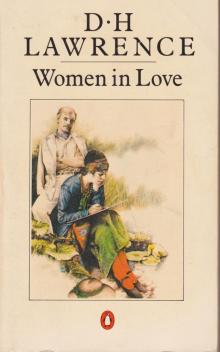 Women in Love
Women in Love The Ladybird
The Ladybird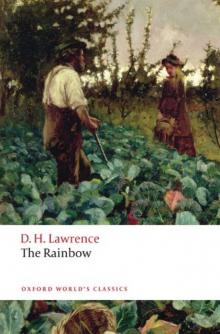 The Rainbow
The Rainbow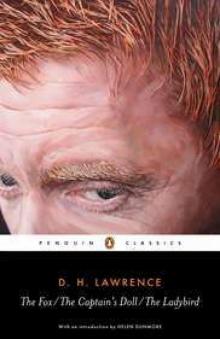 The Captain's Dol
The Captain's Dol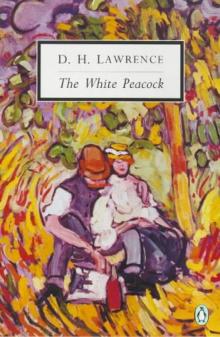 The White Peacock
The White Peacock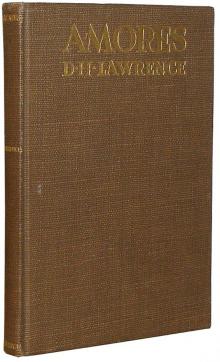 Amores
Amores Lady Chatterley's Lover
Lady Chatterley's Lover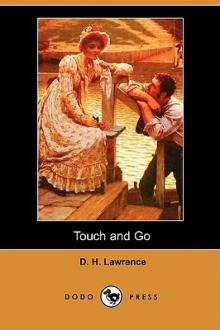 Touch and Go
Touch and Go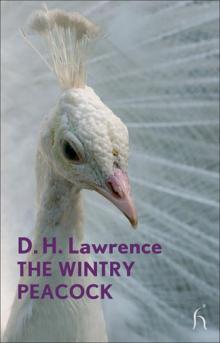 The Wintry Peacock
The Wintry Peacock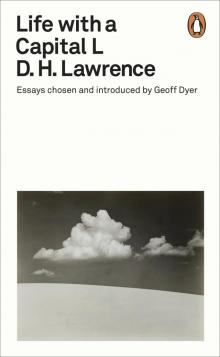 Life with a Capital L
Life with a Capital L The Lost Girl
The Lost Girl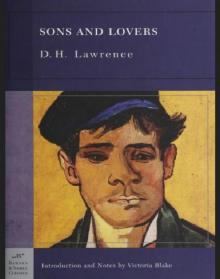 Sons and Lovers
Sons and Lovers England, My England
England, My England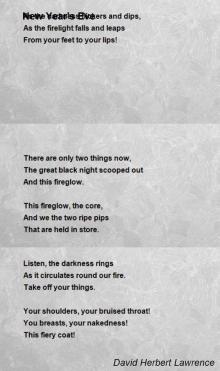 New Poems
New Poems Twilight in Italy
Twilight in Italy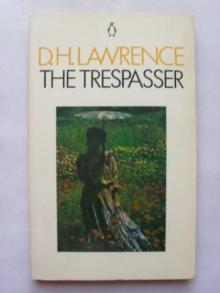 The Trespasser
The Trespasser The Collected Short Stories
The Collected Short Stories The First Lady Chatterley's Lover
The First Lady Chatterley's Lover Kangaroo
Kangaroo Bay
Bay Complete Works of D.H. Lawrence
Complete Works of D.H. Lawrence D H Lawrence- The Dover Reader
D H Lawrence- The Dover Reader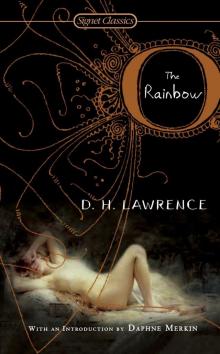 The Rainbow (100th Anniversary ed.)
The Rainbow (100th Anniversary ed.)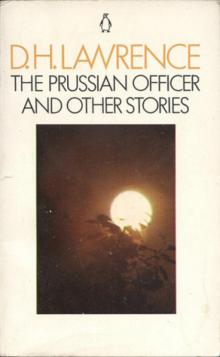 The Prussian Officer
The Prussian Officer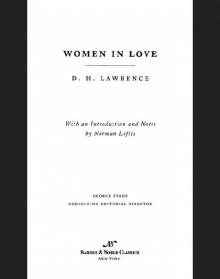 Women in Love (Barnes & Noble Classics Series)
Women in Love (Barnes & Noble Classics Series) John Thomas and Lady Jane
John Thomas and Lady Jane The Bad Side of Books
The Bad Side of Books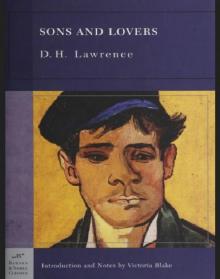 Sons and Lovers (Barnes & Noble Classics Series)
Sons and Lovers (Barnes & Noble Classics Series) Selected Stories
Selected Stories Collected Short Stories
Collected Short Stories Complete Works of D.H. Lawrence (Illustrated)
Complete Works of D.H. Lawrence (Illustrated)